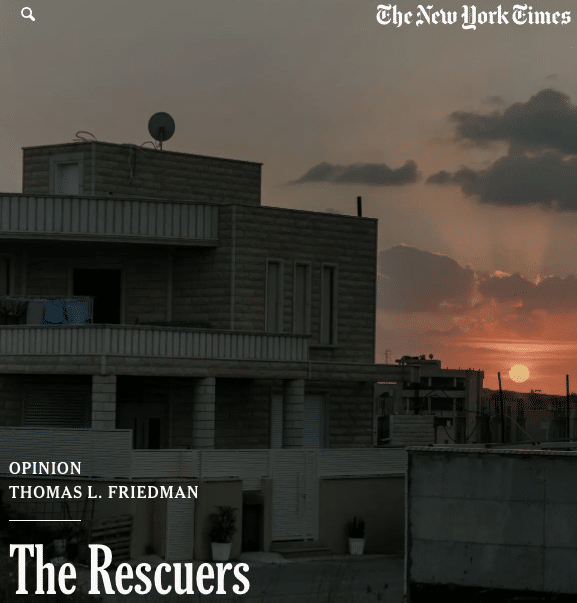[New York Times columnist Thomas Friedman explores daily interactions between Israeli Jews and Israelis in this Thanksgiving Day 2023 commentary:]
I confess that as a longtime observer of the Arab-Israeli conflict, I aggressively avoid both the “From the river to the sea” activists on the pro-Palestinian left and the similarly partisan zealots on the “Greater Israel” Zionist right — not just because I find their exclusivist visions for the future abhorrent but also because the reporter in me finds them so blind to the complexities of the present.
They aren’t thinking about the Jewish mother in Jerusalem who told me in one breath how she just got a gun license to protect her kids from Hamas, and in the next about how much she trusted her kids’ Palestinian Arab teacher, who rushed her children to the school bomb shelter during a recent Hamas air raid. They aren’t thinking about Alaa Amara, the Israeli Arab shop owner from Taibe, who donated 50 bicycles to Jewish kids who survived the Hamas attack on their border communities on Oct. 7, only to see his shop torched, apparently by hard-line nationalist Israeli Arab youth, a few days later, only to see a crowdfunding campaign in Hebrew and English raise more than $200,000 to help him rebuild that same shop just a few days after that.
Over the last half-century, I have seen Palestinians and Israelis do terrible things to one another. But this episode that began with the barbaric Hamas attack on Israelis, including women, little kids and soldiers in communities alongside Gaza, and the Israeli retaliation against Hamas fighters embedded in Gaza that has also killed, wounded and displaced so many thousands of Palestinian civilians — from newborns to the elderly — is surely the worst since the 1947 U.N. partition days.
[Friedman’s column continues]
To that end, I devoted a lot of time on my trip to Israel and the West Bank this month observing and probing the actual day-to-day interactions among Israeli Arabs and Jews. These are always complex, sometimes surprising, occasionally depressing — and, more often than you might expect, uplifting — experiences. Because they reveal enough seeds of coexistence scattered around that one can still dream the impossible dream — that we might one day have a two-state solution for Israelis and Palestinians living between the Mediterranean Sea and the Jordan River.
[Friedman’s column continues]
[Mansour] Abbas is a Palestinian Arab citizen of Israel who happens to be a devout Muslim and a member of Israel’s parliament, where he leads the important United Arab List party. Abbas’s voice is even more vital now because he did not respond to the Hamas terrorism with silence. Abbas understands that while it’s right to be outraged at the pain Israel is inflicting on Gaza’s civilians, reserving all of your outrage for Gaza’s pain creates suspicion among Jews in Israel and worldwide, who notice when not a word is uttered about the Hamas atrocities that triggered this war.
The first thing Abbas said to me about the Hamas onslaught was this: “No one can accept what happened on that day. And we cannot condemn it and say ‘but’ — that word ‘but’ has become immoral.” (Recent polls show overwhelming Israeli Arab condemnation of the Hamas attack.)
[Friedman’s column continues]
Well, it turns out that some Israeli Bedouins who lived near or worked in the border communities ravaged by Hamas helped to rescue Israeli Jews there. Some Bedouins got abducted by Hamas along with Jews, while others were murdered by Hamas because the terrorist group treated anyone who lived or worked in Israeli kibbutzim and spoke Hebrew as “Jews” — deserving to be killed.
[Friedman’s column continues]
And all along, both Jewish and Bedouin victims of Hamas were treated together in Israeli hospitals, where nearly half of all the new incoming doctors are now Israeli Arabs or Druze, as are some 24 percent of the nurses and roughly 50 percent of the pharmacists.
[Friedman’s column continues]
..this Israel-Hamas war, whenever it ends, has been so traumatic for everyone already that it will trigger the biggest debate about what the relations and boundaries between Israelis and Palestinians should be since the U.N. partition plan in 1947. I am sure of it — because anything less will mean permanent war.
I can already tell you that there will be a lot of destructive voices in that discussion: Palestinian and Arab Hamas apologists, who are already denying or playing down Hamas’s atrocities; Jewish supremacist settlers, eager not only to expand in the West Bank but also, insanely, to Gaza, and who show no apparent concern for the devastating suffering of Palestinian civilians killed in Israel’s retaliation there; Benjamin Netanyahu, who will sell Israel’s future down the river to stay in office and out of jail; and Hamas’s useful idiots in the West, particularly on campuses, where students denounce all of Israel as a colonial enterprise while chanting “From the river to the sea, Palestine will be free.”
(Please spare me the explanation that this is really a call for coexistence: I was in Beirut in the 1970s when this chant was popular, and I can assure you it was not a call for two states for two peoples. If you have a mantra that needs 15 minutes to explain, you need a new mantra.) [Emphasis added by People4Peace]
[Friedman’s column continues]
His [Mansour Abbas] party [the United Arab List], broadly speaking, comes from the same Muslim Brotherhood wing of Palestinian politics as Hamas — only where Hamas worships violence and exclusion, Abbas advocates nonviolence and inclusion…. [Abbas said] Hamas’s actions do “not represent our Arab society, nor our Palestinian people, nor our Palestinian nation.”
[Friedman’s column continues]
In our interview, Abbas told me that we need “a new political rhetoric” and not to get drawn back into the old games. “This ‘river to the sea’ talk is not helpful,” he said. “They are making a mistake. If you want to help Palestinians, then talk about a two-state solution and peace and security for all the people.”
[Friedman’s column continues]
I finished my recent journey with two takeaways. The first is that this Gaza war is still far from over. Israel believes there will be no peace in or from Gaza as long as Hamas is in power there.
But the other is that just as the darkness of the Yom Kippur War produced the dawn of the Camp David treaty, and just as the viciousness of the first intifada and the Israeli pushback led to the Oslo Accords, out of the horrors of Oct. 7 will one day come another attempt to build two states for these two indigenous peoples.

